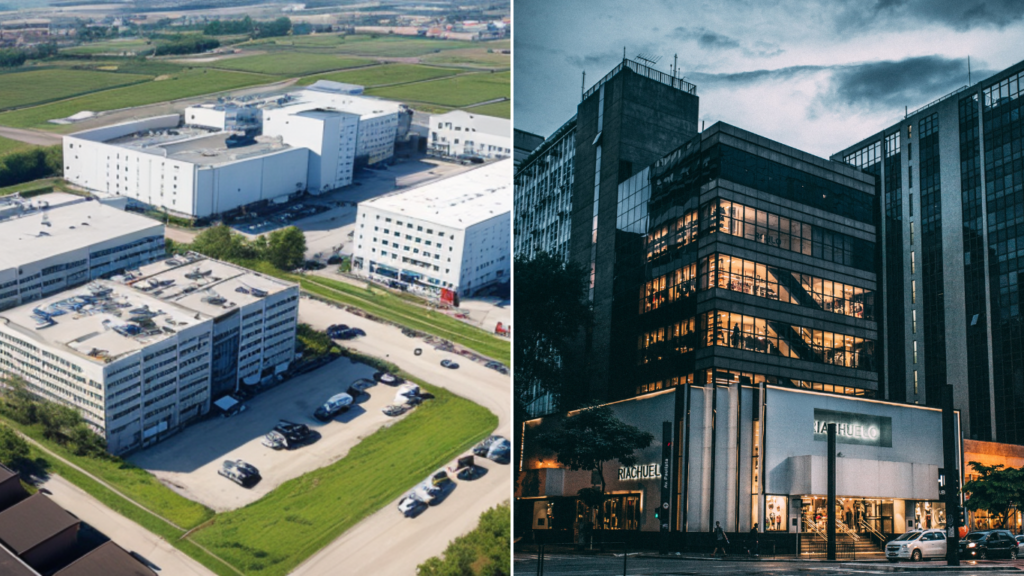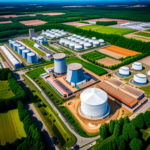
When it comes to investing in land in Malaysia, it’s important to understand the differences between industrial land and commercial land. While both types of land are used for business purposes, they have different characteristics, zoning regulations, and potential uses. Here’s what you need to know:
- Definition and Purpose of Industrial Land and Commercial Land
- Commercial land is used for businesses such as shopping malls, offices or other business premises. Industrial land is used to set up factories, warehouses, fulfilment centre etc.
- Industrial land is used for manufacturing, processing, and storage purposes.
- This type of property is characterized by large, open spaces with warehouses, factories, and distribution centers. Industrial land is located near transportation hubs, such as airports, ports, and highways, to facilitate the movement of goods and materials.
- It is also equipped with specialized infrastructure, such as loading docks, cranes, and rail yards, to support industrial operations
- Commercial land is designed for retail, office, or service-oriented businesses
- Commercial land is typically used for businesses that offer goods and services to the public, such as restaurants, retail stores, and offices. Commercial properties are often located in busy areas, such as downtown districts or shopping centers, to attract customers.
- They are also designed to be visually appealing and easily accessible to pedestrians and motorists. Commercial properties may be leased or owned by businesses and are used for a variety of purposes, from offices to retail stores
- Location of Industrial Land and Commercial Land
- Industrial land is often located near transportation hubs such as airports, seaports, and highways to facilitate the transportation of goods and materials.
- In Malaysia, industrial land is commonly found in areas such as Selangor, Johor, and Penang. These areas have established industrial parks and free trade zones that offer a range of facilities and services to support manufacturing and logistics operations.
- Commercial land, on the other hand, is usually located in prime areas like the city center, shopping malls, and other commercial hubs with high population density and heavy foot traffic.
- Kuala Lumpur is the primary commercial hub in Malaysia, with several commercial districts such as Bukit Bintang, KLCC, and Bangsar. Other cities such as Penang, Johor Bahru, and Kota Kinabalu also have established commercial areas with a mix of retail, dining, and office spaces.
- Industrial land is often located near transportation hubs such as airports, seaports, and highways to facilitate the transportation of goods and materials.
- Infrastructure of Industrial Land and Commercial Land
- In terms of infrastructure, industrial land may require more extensive utilities and services, such as power, water, gas, loading capacity, ceiling heights, waste management, and security systems, to support the needs of industrial businesses
- Commercial land may require less extensive utilities and services, such as power, water, and waste management, to support the needs of commercial businesses.
- Building and Usage Requirements
- Industrial land usually requires larger and more specialized buildings than commercial land, such as factories, warehouses, and distribution centers. These buildings may require higher ceilings, wider doors, heavy-duty floors, and specialized equipment to accommodate the needs of different industries.
- Industrial land may have more stringent usage requirements, such as environmental regulations, zoning restrictions, and safety standards, which may limit the types of activities that can be conducted on the site.
- On the other hand, commercial land requires smaller and more flexible buildings than industrial land, such as shops, offices, and restaurants. These buildings may require different layouts, designs, and features, depending on the type of business and its target customers.
- Commercial land may have fewer usage requirements than industrial land, which allows businesses to operate more freely and creatively.
- Industrial land usually requires larger and more specialized buildings than commercial land, such as factories, warehouses, and distribution centers. These buildings may require higher ceilings, wider doors, heavy-duty floors, and specialized equipment to accommodate the needs of different industries.
- Regulations and Permits
- Industrial land is more specialized and requires more specific regulations and permits than commercial land.
- There are often more regulations and permits required for industrial land due to the potential environmental impact of manufacturing activities. Commercial land is subject to zoning regulations and permits, but these are typically less strict than those required for industrial land.
In conclusion, industrial land and commercial land serve different purposes and have unique characteristics that should be understood before investing. By considering factors such as location, size, cost, regulations and permits, and types of businesses suited for each, investors and businesses can make informed decisions when choosing to invest in these types of properties. The most important factor is to know what’s your purpose of getting the property and make sure the property best suits your business.
Kindly contact Mr.HAO (012-690 8291) for viewing appointment or enquiry.
Dear property owners, please feel free to call/SMS/whatsapp Mr. Hao (+6012-690 8291) for any properties FOR SALE/RENT
Whatsapp link: https://wa.me/60126908291
REN 09622, Email: sityonghao@industrialandland.com
Other related topics:
What is industrial real estate?
While we have made every attempt to ensure that the information contained in this site has been obtained from reliable sources, industrialandland.com is not responsible for any errors or omissions, or for the results obtained from the use of this information. All information in this site is provided “as is", with no guarantee of completeness, accuracy, timeliness or of the results obtained from the use of this information, and without warranty of any kind, express or implied. Please contact us if you found any copyrighted or inaccurate information, we will take action of removal or amendment immediately.

